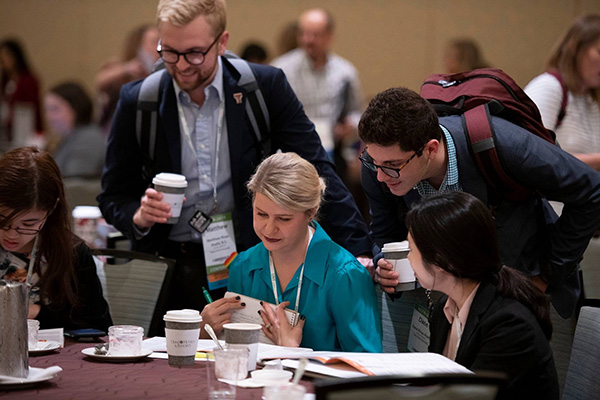
Darienne Clinton, Austin Ross, Jonathan Moore, and Connad Higgins assisted in the development of research for each presentation
Four Human Development and Family Studies (HDFS) undergraduate students had the opportunity to present research alongside Texas Tech faculty members at the National Council on Family Relations (NCFR) in November 2019.
Darienne Clinton and Austin Ross assisted Shera Thomas-Jackson, Ph.D., and Gail Bentley, Ph.D, in analyzing data for their poster presentation, Understanding Paired Data of Parents of Children with DS: A Qualitative Directed Content Analysis.
Leading up to the presentation, Darienne worked closely with Dr. Jackson and Dr. Bentley, assisting with literature reviews, learning about qualitative analysis and gaining a better understanding of the research components. She also presented the research poster to fellow colleagues at the conference.
After graduation, Darienne plans to pursue a master's degree in occupational therapy and to work with children in the foster care system. She added that her HDFS degree has helped her learn to be more self-aware and informed about what systems are in place for communities to function and how to help make a difference.
"My degree has given me insight into many of the psychological aspects of growth, not just in children, but all the way through life," Darienne said. "It has shown me the importance of the community with courses such as Family and the Community; as well biases and prejudices I was previously unaware of from courses such as Development of Cross Cultural Perspectives."
Austin, who assisted Dr. Thomas-Jackson and her co-author Janis Henderson, Ph.D. at their NCFR roundtable with the Student Affiliate Council Meeting, will be submitting a poster for the student poster competition at the TxCFR 2020 conference.
The roundtable – aimed at outreach to undergraduate affiliate councils from fellow universities across the nation – gave Austin the opportunity to speak about his experience and the impact of Texas Tech's student organization, Tech Council on Family Relations (TechCFR).
"During these sessions alongside Dr. Jackson, I was able to provide insight into how TechCFR is able to make a positive impact around our school and community by providing opportunities, such as volunteering and educational events, to our members and students within the College of Human Sciences," Austin said.
Austin also added that his experience as an HDFS student will assist him in his goals to attend graduate school to pursue a degree in Couple, Marriage, and Family Therapy, practice marriage and couples counseling, and impact his community positively by helping couples cope with the stressors of marriage and growth in a progressing modern world.
Students Jonathan Moore and Connad Higgins worked closely with Dr. Thomas-Jackson on submitting the IRB, initial analysis, and presentation of research for her NCFR roundtable, How do Generation Z students do gender? Exploring the social construction of gender today.
At the roundtable discussion, Johnathan and Connad helped Dr. Thomas-Jackson in answering questions, clarifying parts of their research and asking those participating for their feedback. Because this was both Johnathan and Connad's first experience presenting in this format, Connad said Dr. Thomas-Jackson guided them through the process and ensured they were prepared for the conference.
Johnathan presented at TxCFR 2019, NCFR 2019, and was a panelist at the TTU Women and Gender Studies Colloquium in October 2018. He will also be submitting a poster for the student poster competition at TxCFR 2020.
Along with these presentations, Johnathan says the skills he's learned through HDFS will help him in his career goals to attend graduate school for Couple, Marriage, and Family Therapy and to work with military families through the Veteran's Association in his hometown of El Paso, Texas.
"Using what I've learned in HDFS, I feel like I'm better equipped the identify stressors in families, their communities and how that may affect a person as an individual," Johnathan said. "As my career goal is to be a Licensed Therapist, I think having the ability to think critically about a family's dynamic is crucial to providing families the best possible experience."
Connad will be working closely with Christy Rogers, Ph.D., on his research for the TxCFR 2020 poster competition. He's also received a small grant from the Texas Tech Center for Transformative Undergraduate Experiences (TrUE) for his research with Dr. Rogers. With the help of these funds, Connad says he and Dr. Rogers will carry out a small-scale research project investigating the possible contexts of in-person/table-top role-playing games in the social and psychological development of adolescents and emerging adults.
Connad, who has been accepted into the Human Development and Family Studies post-baccalaureate doctoral program at Texas Tech University, says his career goals are focused on remaining within academia and research.
"My specific interests are to study mechanisms that promote and reinforce the social relationships and emotional health of adolescents and emerging adults," Connad said. "The multidisciplinary nature of HDFS helps me to better understand not only the nature of these areas from a behavioral and psychological point of view, but also gives me the knowledge and skills to develop methods to help individuals and families make positive changes in themselves and their loved ones."
